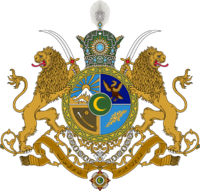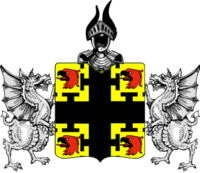Treaty between Çakaristan and Imperial Federation
The Treaty of friendship and cooperation between the Çakar Empire and the Imperial Federation of Ralgon, Nixtorm, and Tar-Palantir was proposed in 1719 AN.
Text
TREATY OF FRIENDSHIP AND COOPERATIONBETWEEN
THE ÇAKAR EMPIRE
AND
THE IMPERIAL FEDERATION OF RALGON, NIXTORM, AND TAR-PALANTIR
His Majesty, Jaaguzan, Shahanshah of Çakaristanand
His Majesty, Anari'on I, the Emperor of Imperial Federation of Ralgon, Nixtorm, and Tar-Palantir
desire for a diplomatic relationship and good understanding between them, underpinning further friendship between their respective countries, have agreed to the following articles of agreement:Article I – Peace and friendship
There shall be a firm and perpetual state of peace and friendly relations between His Majesty, the Shahanshah of Çakaristan and His Majesty, the Emperor of Imperial Federation of Ralgon, Nixtorm, and Tar-Palantir, between Their Heirs or Successors, and between the Çakar Empire and the Imperial Federation of Ralgon, Nixtorm, and Tar-Palantir, in this treaty the High Contracting Parties, and between their Citizens, without discrimination.Article II - Sovereignty and territorial integrity
Each High Contracting Party shall respect the independence, sovereignty and territorial integrity of the other party. The High Contracting Parties shall continue to develop and consolidate the relations of sincere friendship, good neighbourliness and comprehensive cooperation existing between them on the basis of the aforesaid principles as well as those of equality and mutual benefit.Article III - Airspace
Each High Contracting Party commits that any overflight of its airspace by aircraft registered upon the territory of the Other High Contracting Party, whose source and destination are outside the jurisdiction of the Overflown High Contracting Party and which make no intermediate landing upon the territory of the Overflown High Contracting Party, shall be considered to fall outside the remit of customs or immigration regulations and wholly outside the jurisdiction of any Third Parties, without prejudice to the exclusive right of the Overflown High Contracting Party to approve or deny such overflight as it sees fit.The High Contracting Party can set up a Prohibited airspace, an overflight is strictly prohibited. The High Contracting Party informs about Prohibited airspace and appropriate punitive measures follow an overflight of an aircraft registered with the other High Contracting Party.
Article IV – Diplomatic mission
The High Contracting Parties will maintain regular contacts with each other on major international problems affecting the interests of both of their countries and governments by means of meetings, and exchanges of views between their leading statesmen, visits by official delegations and special envoys of the governments, and through diplomatic channels.The High Contracting Party will make an embassy available for each other. For the embassy, associated grounds, associated vehicles, leading statesmen, visits by official delegations, special envoys of the governments and ambassadors, diplomatic immunity applies.
Each High Contracting party recognizes and respects the procedures of acceptance by the ambassador, by handing over a letter of credence, which is addressed from one head of state to the other asking to give credence.
Article V - Recognition of bureaucracy
Each High Contracting Party gives to the other full faith and credit to all public acts, records, contracts and judicial proceedings in the field of civil law, including records and documents on marriage, property, titles, death and inheritance, in as much as any act, record, document, contract, proceeding is done according to the law.Article VI – Visa policy
Both High Contracting Parties grant access to each other's citizens by issuing a visa on arrival. A visa may be refused on the grounds of dual citizenship of the citizen concerned, if there is criminal involvement, terrorism or similar. This shall be determined respectively by the High Contracting Party concerned.Article VII - Exchange of territory
The Shahanshah hands over the city of Rouge and its territory to the emperor. The Emperor hands over Devil's Island to the Shahanshah. The handovers take effect on 1.I.1720 AN, all remaining residents automatically becoming citizens of the new owner. The Emperor will not claim territory on the continent of Corum for at least 20 Norton years.Article VIII - Trade
The Shahanshah and the Emperor open their borders for trade. They express confidence in each other to consider South Island and Tarria a single customs zone. They will work on infrastructure to facilitate trade within this customs zone. In doing so, the Shahanshah and the Emperor will not charge additional trade tariffs to each other.Article IX - Interpretation
Any difference of interpretation of any Article or Articles of this Treaty which may arise between the High Contracting Parties will be settled bilaterally by peaceful means in a spirit of mutual respect and understanding.Article X - Ratification
This Treaty enters into force upon its signature and ratification by Both High Contracting Parties in accordance with their respective domestic procedures.
Signed on 11.XII.1719 AN at Tarria:For the Çakar Empire:
On behalf of His Majesty Jaaguzan, Shahanshah of Çakaristan
Dervish Çelebi
Grand Vizier of Çakaristan
For the Imperial Federation of Ralgon, Nixtorm, and Tar-Palantir:
Anarion Ral of House Adrestia
Emperor of the Imperial Federation and its Dominions
King of Drag'os, King of Adrestia, Lord of Al Hamra, etc.


